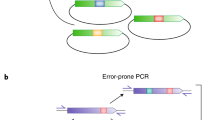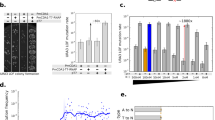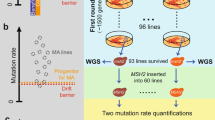Abstract
Nucleic acids are replicated with conspicuous fidelity. Infrequently, however, they undergo changes in sequence, and this process of change (mutation) generates the variability that allows evolution. As the result of studies of bacterial variation, it is now widely believed that mutations arise continuously and without any consideration for their utility. In this paper, we briefly review the source of this idea and then describe some experiments suggesting that cells may have mechanisms for choosing which mutations will occur.
This is a preview of subscription content, access via your institution
Access options
Subscribe to this journal
Receive 51 print issues and online access
$199.00 per year
only $3.90 per issue
Buy this article
- Purchase on Springer Link
- Instant access to full article PDF
Prices may be subject to local taxes which are calculated during checkout
Similar content being viewed by others
References
Luria, S. E. & Delbrück, M. Genetics 28, 491–511 (1943).
Lederberg, J. & Lederberg, E. M. J. Bact. 63, 399–406 (1952).
Cavalli-Sforza, L. L. & Lederberg, J. Genetics 41, 367–381 (1956).
Hayes, W. The Genetics of Bacteria (Blackwell, Oxford, 1964).
Lea, D. E. & Coulson, C. A. J. Genet. 49, 264–285 (1949).
Armitage, P. J. R. statist. Soc. B. 14, 1–40 (1952).
Mandelbrot, B. J. appl. Prob. 11, 437–444 (1974).
Luria, S. E. Cold Spring Harb. Symp. quant. Biol. 16, 463–470 (1951).
Hadley, P. J. infect. Dis. 40, 1–312 (1927).
Ryan, F. J. Nature 169, 882–883 (1952).
Shapiro, J. A. Molec. Gen. Genet. 194, 79–90 (1984).
Reynolds, A. E., Felton, J. & Wright, A. Nature 293, 625–629 (1981).
Campbell, J. H., Lengyel, J. A. & Langridge, J. Proc. natn. Acad. Sci. U.S.A. 70, 1841–1845 (1973).
Hall, B. G. J. Bact. 129, 540–543 (1977).
Hall, B. G. & Zuzel, T. Proc. natn. Acad. Sci. U.S.A. 77, 3529–3533 (1980).
Reanney, D. C. Nature 307, 318–319 (1984).
Author information
Authors and Affiliations
Rights and permissions
About this article
Cite this article
Cairns, J., Overbaugh, J. & Miller, S. The origin of mutants. Nature 335, 142–145 (1988). https://doi.org/10.1038/335142a0
Received:
Accepted:
Issue Date:
DOI: https://doi.org/10.1038/335142a0
This article is cited by
-
Whole genome sequencing in clinical practice
BMC Medical Genomics (2024)
-
Evolutionary honing in and mutational replacement: how long-term directed mutational responses to specific environmental pressures are possible
Theory in Biosciences (2023)
-
Stochastic models of Mendelian and reverse transcriptional inheritance in state-structured cancer populations
Scientific Reports (2022)
-
Estimation of Rates of Non-neutral Mutations When Bacteria are Exposed to Subinhibitory Levels of Antibiotics
Bulletin of Mathematical Biology (2022)
-
Schiff base metallodrugs in antimicrobial and anticancer chemotherapy applications: a comprehensive review
Emergent Materials (2022)
Comments
By submitting a comment you agree to abide by our Terms and Community Guidelines. If you find something abusive or that does not comply with our terms or guidelines please flag it as inappropriate.



